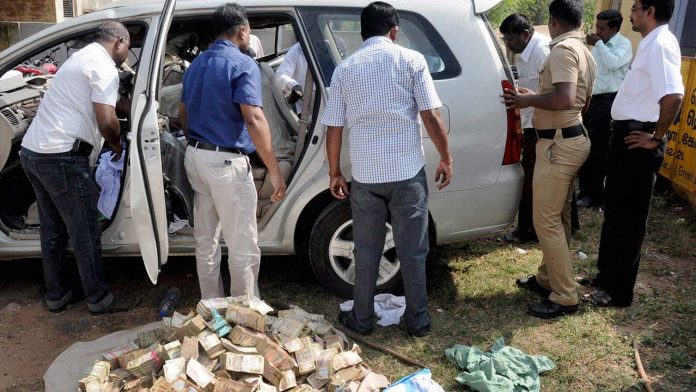This article is written by Parth Sharma, pursuing a Certificate Course in Advanced Corporate Taxation from LawSikho.com. Here he discusses “Powers and Procedure for Income Tax Raids (Search and Investigation)”.

Introduction
Power and Procedure for Income Tax raid (Search and investigation) fall under the Indian Income Tax Act of 1961. The main aim of a raid is to curb black money which actually is unaccounted money on which tax is not paid, Black money does not necessarily refer to Money as in currency only it may involve Real estate, foreign currency, gold and jewellery, and other Movable or immovable property on which tax is avoided and funds earned illegally. Raids have been highly successful and getting the black money hoarded by people. It creates a fear in the minds of people and forces them to pay their taxes regularly. An important fact which we all must know that Tax has to be paid even when income is earned from illegal sources. So, there are only two things which is certain in human life Death and Taxes.
When we talk about Raid we all remember Ajay Devgan`s Movie Raid. Though that movie gives us a bit of insight on Tax raids we still have to go through this article to understand the basics of a Raid and the procedure and power thereof.
Difference between Survey and Search and Seizure
There are major differences between the two regarding the scope of power that the authorised officers have. Under the survey, only the places deemed to be places of business or profession can be entered. In search, any premises including residential premises can be entered. Only books of accounts can be impounded in a survey while all kinds of articles can be seized in a search. Statements are recorded in both; however, the only search consists of a statement under oath having wide legal implications and increased risk in case of dishonesty. There is no power of personal search in the survey while it does vest in the officers in case of a search operation. Thus, the survey can be considered an initial operation while search and seizure bring more focussed once a reason to believe has been developed through a survey.
Search and Seizure
It is a constitutionally valid process which happened under the following circumstances:
- Reliable information about Tax evasion by any source or tips provided by Citizens.
- Inputs received by Government departments.
- Information received regarding disproportionate spending or investing without showing matching income for the same.
- Illegal investment in real estate or Unexplained transactions regarding shares or cash credits.
- Inputs received from Assessment of tax records. For example, a sudden increase in income earned or sudden decrease in income but increase in expenditure.
Who has the power to conduct the raids
In accordance with Section 132(1) of the Income Tax act 1961. The Principal Director General or The Director General or The Principal Director or Director or Principal Chief Commissioner or Chief Commissioner or Principal Commissioner or Commissioner May authorize an Additional Director or Additional Commissioner or Joint Director or Joint Commissioner or Assistant Director or Deputy Director or Assistant Commissioner or Deputy Commissioner or Income-tax Officer to conduct a tax raid. The authorizing officer will do the authorized tax if he has a “reason to believe” that A taxpayer has failed to comply with any summons or notices sent to him by the Income Tax Department or He has with him money and secondly, such money represents either wholly or partly income or property which has not been disclosed and on which tax is avoided.
Power of authorities during a Raid
Enter and search any building, place etc where they have a reason to suspect that things representing undisclosed income are kept for example Currency, Gold or Silver, Property papers or books of account
- They may even break open any locks if keys are not available
- They may carry personal search of a person who they suspect of having undisclosed items.
- They may seize the items if they believe it to be undisclosed
- May make notes or inventory of things found, may mark thing for identification and even take copies of books of account or any other document
Properties that can be seized during a raid
- Documents regarding property or any transfer or buying of assets
- Undisclosed Cash, valuables like gold silver etc
- Storage devices which may have evidence or undisclosed assets
- Books of accounts or business diaries.
Assets which cannot be seized during a raid
- Disclosed Cash and Assets
- Cash/Asset Duly explained or shown in books of account
- Stock in Trade of business
- Jewellery with tax return
Right of a person during Income tax raid
- Ladies to be searched only by a lady privately
- A person may have 2 respectable and independent persons of his choice from the locality as his witness.
- A lady has the right to go after being searched if according to customs.
- Children may be allowed to go to school after the bag check.
- A medical practitioner may be called in case of emergency.
- To have meals at a normal time
- To inspect seals before and during the reopening
- To have a copy of Punchnama
- To have a copy of statement give used against him
- To inspect the books or account
Duties of a person during a raid
- To allow complete and unhindered access in the premises business or residential during the raid being conducted.
- Hand over all the important documents like Books of Accounts, Property documents etc.
- To help officers investigate by explaining the ownership or help identify the documents.
- To identify everyone, present on the premises and their relationship must be established in front of the officers. IT officials must not be manipulated by impersonation. If he cheats or plays fraud by pretending to be some other person or knowingly substitutes one person for another, it is an offence punishable under section 416 of the Indian Penal Code.
- There should be no entry of any authorised person in the premises during the ongoing raid the person being must make sure of this.
- A Person or anyone close to him must not get rid of any article without knowledge or notice of the authorised officer. If any person does the above mentioned then he will be made liable under section 204 of Indian penal code and maybe be imprisoned or fined or both.
- Must answer all questions honestly and to the best of his knowledge.
- If the person gives false statement while under oath or affirmation there can be punished with imprisonment or fine or both Under 181 sections of IPC
- If knowingly false information is provided to the officers by the person investigated he can be made liable under Section 191 of IPC for giving false information.
- Panchnamas, Inventories and other documents need to be signed.
- Cooperate and maintain peace during the research and even do the same if follow up investigation is done.
Rights of a person after a raid
The Person under whose custody there are Any books of account or any other important document may make copies or take extracts but in the presence of authorised officers or any other person authorized by him. An aggrieved person has the option of filing a writ petition before the High Court which has jurisdiction to challenging the raid conducted it has reasons to believe or feels that the action of the department was unfair or unreasonable. He can also challenge the assessment and file an appeal before the Commissioner of Income Tax (Appeal).
Important cases related to income tax raid
We see judgements regarding search and seizure almost every day. There are hundreds of case and multiple raids throughout India on a weekly basis. Some important case laws that come from these judgements are as follows.
Trial by Media. Case name- Rajendran Chingaravlelu V. R.K.Mishra, Addl.CIT(2-10) 320 ITR1 (SC) (10)
The court, in this case, put an end to the practice followed by officers to inform the News and Media organisation even before the completion of raids. This great judgement brought an end the evil practice of trial by media and media are informed only after the full raid is completed so that the innocent do not suffer.
Non-Resident premise search. Case Name – Ram Kumar Dhanula v. UOI (2001) 252 ITR 205 (Rajasthan High court)
The court made it clear that no matter if a person is a Non- Resident his premise can still be searched by the Income tax if they have reason to believe there are undisclosed income and assets.
Constitutional validity Case name – Pooran Mal v. DIT (1974) 93 ITR 505 (SC)
The Supreme Court helped that Section 132 of IT act and rule 112 of IT rules 1962 are not violative of Article 19 of the Indian constitution. This provides for reasonable restriction to article 19 of the constitution.
MP Sharma v Satish Chandra 1954 AIR 300
This held that search and seizure is a temporary interference with the right to hold article and premises. There are safeguards which make sure that this is not misused one of them being that permission is sought from the Highest officers of the department.
Students of Lawsikho courses regularly produce writing assignments and work on practical exercises as a part of their coursework and develop themselves in real-life practical skill.
https://t.me/joinchat/J_0YrBa4IBSHdpuTfQO_sA
Follow us on Instagram and subscribe to our YouTube channel for more amazing legal content.
 Serato DJ Crack 2025Serato DJ PRO Crack
Serato DJ Crack 2025Serato DJ PRO Crack











 Allow notifications
Allow notifications


